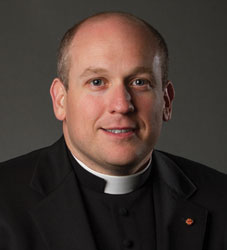 The image of a mustard seed was something very familiar to those living in the Holy Land 2,000 years ago. The mustard seed was symbolic for the smallest of things. The Lord Jesus teaches us in this Sunday’s Gospel to be cautious in underestimating something simply by its initial appearance.
The image of a mustard seed was something very familiar to those living in the Holy Land 2,000 years ago. The mustard seed was symbolic for the smallest of things. The Lord Jesus teaches us in this Sunday’s Gospel to be cautious in underestimating something simply by its initial appearance.
A mustard seed yields a mighty tree, an image not unique to this Sunday’s Gospel. A strong tree was symbolic in ancient times, including in the Old Testament, of various empires on the earth. From this Sunday’s Gospel, the mustard tree becomes a symbol for the Church, singular in her beginning yet growing large and strong to the point that others some and dwell in her shade and strength. Two millennia ago, the religious and secular authorities thought nothing more of Jesus after he was crucified, but his life, death, and resurrection became the singular see from which the Church came forth. The world did not think much of the early Church either. Today, the Church draws all people to herself as the source and fount of God’s grace in the world.
The Church is both a static and active reality.
She exists because she is a divine initiative, but much of her vitality is contingent upon our discipleship, our free choice as to whether or not we cooperate with the grace of God in our own lives.
We are the living stones that make up the Church. We must make the active choice to advance her agenda of the Gospel, given to her by our Lord.
The mustard seed may seem insignificant to many, not getting a second thought, but locked within is so much potential. The same is true with us. To the world we may seem insignificant or unremarkable, but not to God. God knows the potential that lies within each and every human life; the power and possibility to change the world by simply being the men and women that he has called each of us to be, to use the gifts and talents given by him to build up the Kingdom here and now.
Before the parable of the mustard seed, we were presented with the parable of the farmer who scatters the seed but knows that the rest is not up to him. Jesus is reminding us that we must rely on God’s grace. The farmer cannot make the seed grow on his own. He does his part in sowing the seed but nature does the rest; so it is with our discipleship. We are called to do what we can with what God has gifted us and to allow God to do the rest; this demands trust. Trusting in the gifts and talents that God has given us, trusting that he will do his part, and trusting that, in the end, all things will work for his purposes.
Don’t under estimate the power and possibility that God has placed within you.
Use your God-given gifts for his glory and for the good of your fellow sisters and brothers. If each of us would simply do our individual part in God’s grand design then we would find the world set ablaze with his grace, his love, and his mercy. God bless you!
Father Christopher House is the Rector-Pastor of the Cathedral and serves in various leadership roles within the diocesan curia, specifically Chancellor and Vicar Judicial.